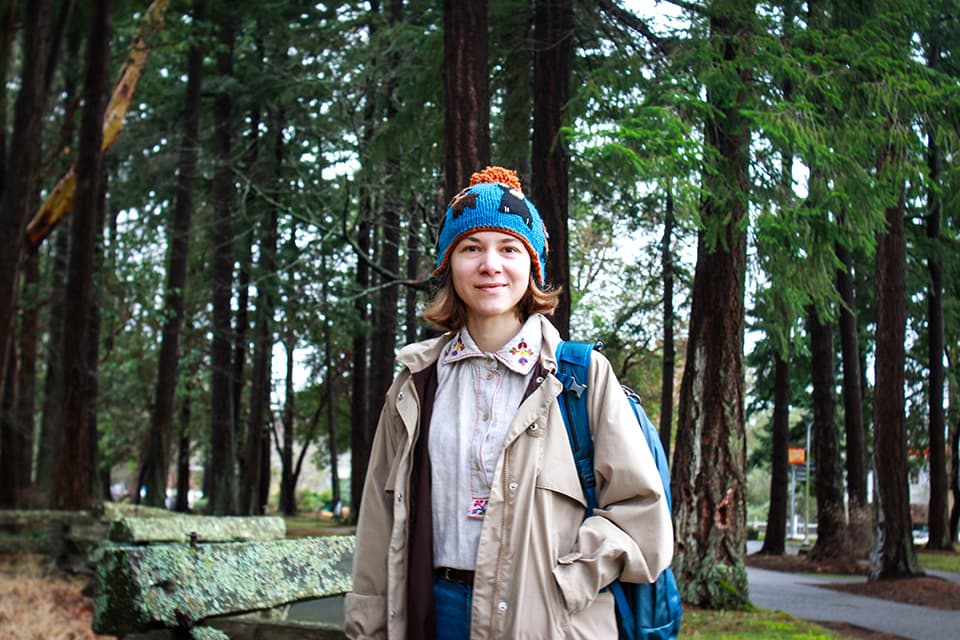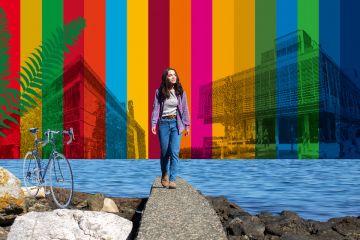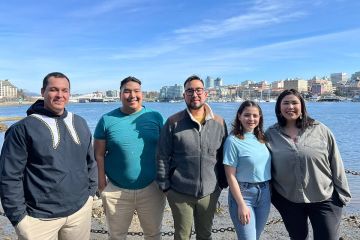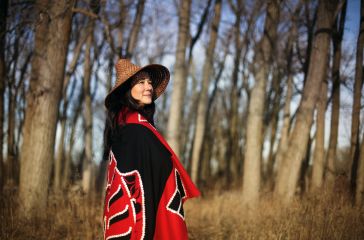Studying Ukraine’s national literature in wartime
- Katy DeCoste

When Russia launched a full-scale invasion of her home country of Ukraine in 2022, Olha Chaplia was nearing completion of her doctoral dissertation, an in-depth study of the first work of Ukrainian literature: Слово о законѣ и благодѣти (usually translated as Sermon on Law and Grace).
Two years later, after travelling to UVic as one recipient of the Ukraine Emergency Doctoral Student Fellowship in the Humanities, Olha reflects, “My research is primarily a study of myself. It’s an attempt to understand myself through my roots, my identity as a Ukrainian and a Christian, as well as the richness of my cultural tradition.”
Born in Ukraine and raised by a church cantor, Olha grew up surrounded by music, nurturing a love of singing with her choir. When she considers her interest in early Ukrainian literature, she credits the professors that introduced her to Ukrainian music and poetry. After completing doctoral studies in Ukraine, Olha was selected to receive the Ukraine Emergency Doctoral Student Fellowship in the Humanities, which is funded by Humanities faculty and staff, as well as the Wishewan family and Booster Juice, and provides students with financial support, faculty mentorship and office space to safely work and study in Canada.
“What motivates me in my research? Probably my love of all things old,” Olha says, laughing. “But seriously, what motivates me the most are people—my friends, and teachers who have become my friends.” These include her supervisor, poet and professor Nazar Fedorak, and literature professor Bodhana Krysa, who both teach at the Ivan Franko National University of Lviv, where Olha completed a master’s degree in philology and her doctoral studies.
At UVic, supervisor Serhy Yekelchyk and colleagues at the Centre for Global Studies, Oliver Schmidtke (Political Science) and Jodie Walsh, have been invaluable supports. Yekelchyk, a professor with the Department of Germanic and Slavic Studies and historian of modern Ukraine, and Charlotte Schallié, Chair of the Department of Germanic and Slavic Studies, helped launch the Emergency Fellowship that brought Olha to UVic.
For the past several years, Olha has studied the Sermon, which she argues is an important historical record, as well as a literary work of cultural and religious significance. Written in Kyiv in the 11th century, it’s emblematic of Ukraine’s national literature and distinctive cultural history.
Like many Ukrainian artists and scholars, Olha sees her work as part of the defense of her home and its right to self-determination. “I am convinced that this war was also about the Sermon on Law and Grace, which the Russians had been taking away from us for a long time. I have to work for our victory in my small field.” It was difficult to leave home during the war.
“It’s impossible to disconnect from the news of the destruction of my country and the countless deaths of my people at the hands of Russia,” Olha says.
It’s been a time of challenges, but also a time of gratitude. Sitting at my desk in my office, looking out the panoramic window at the squirrels, birds, and even deer, I’ve been able to find moments of comfort. These are invaluable gifts—the opportunity to be safe, and to work in this environment.”
—Olha Chaplia
As she looks to the future, Olha plans to return home and hopes to someday teach at a Ukrainian university. At the same time, she wants to share her knowledge and her culture with the world, whether by studying and teaching in Europe or North America, or by publishing her research as a book. Olha knows that the war has led to an interest in Ukraine’s history and culture at Western universities, and it’s an opportunity that she doesn’t want to let pass.
“I am open to new and sometimes unexpected things. I try to recognize the work of grace in my life so I can serve where I am called. Perhaps this is our chance to speak up for ourselves, because we have a lot to tell the world. The study of Ukrainian history and the promotion of Ukrainian culture can help separate the truth from Russian propaganda. Knowledge saves lives,” Olha says of the importance of her research. “And this is a case where that’s not a metaphor, but a cruel reality of the war. We are now seeing the consequences of a long-lasting cultural genocide. Because it was only partially successful, they began to kill us physically.
Photos
In this story
Keywords: arts, international, humanities, donor relations
People: Olha Chaplia





